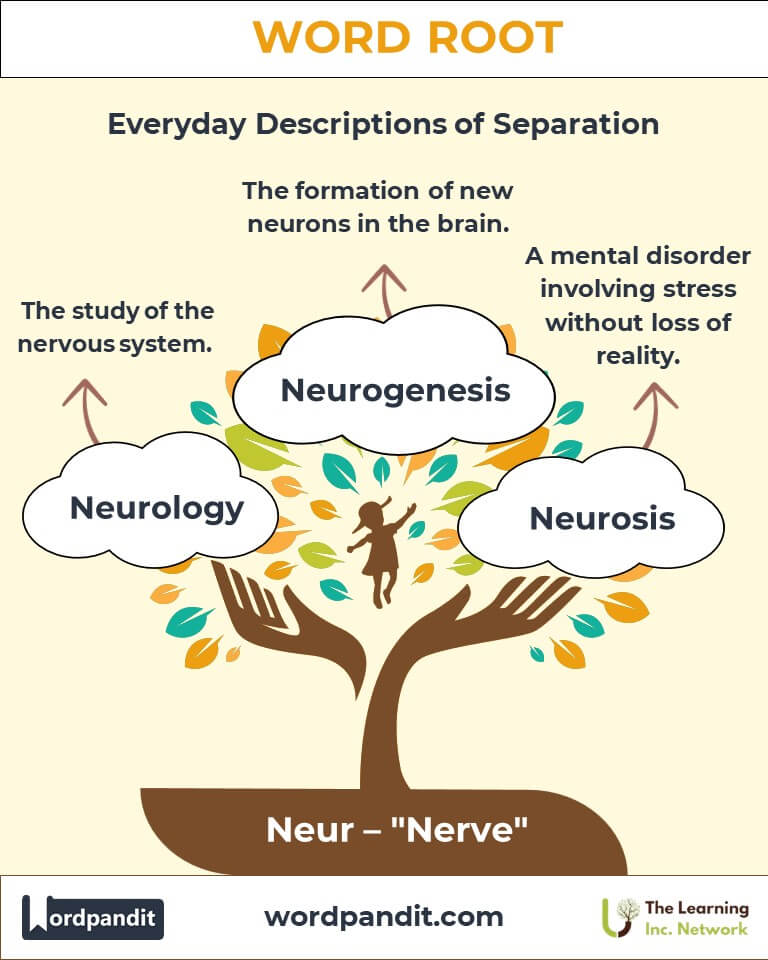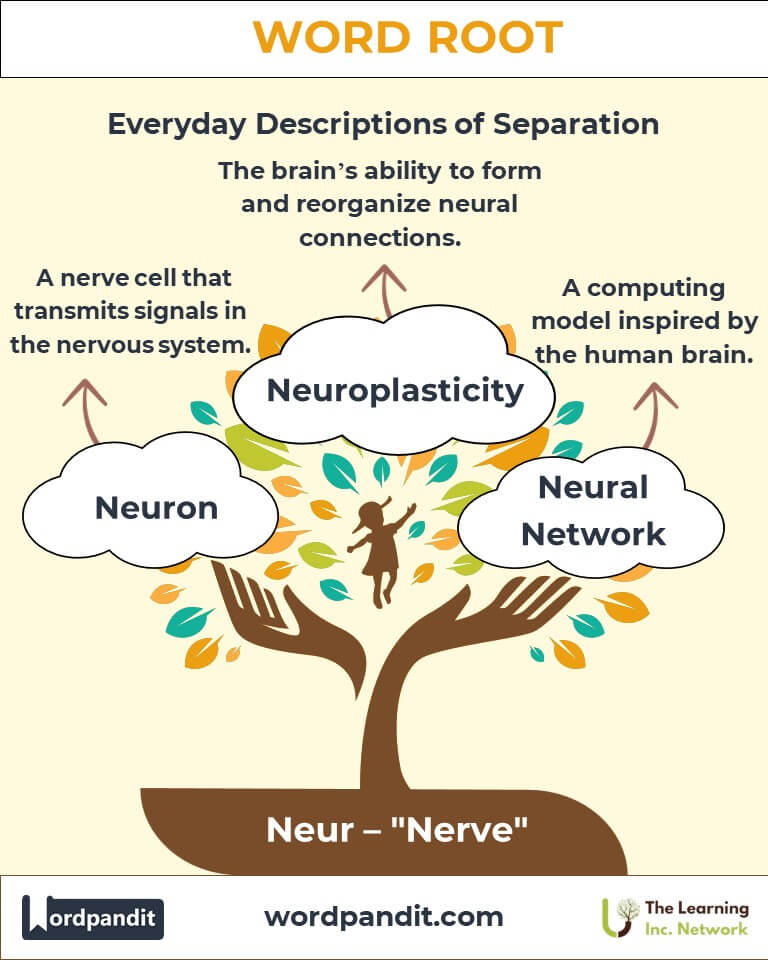Neur: The Root of Nerve in Science and Language
Byline:
Uncover the fascinating journey of the root "neur," derived from the Greek word for "nerve." From essential medical terms like "neurology" to everyday references like "neural networks," "neur" has branched into numerous disciplines, showcasing its vital role in understanding connections and systems in the human body and beyond.

Table of Contents
- Introduction: The Power of "Neur"
- Etymology and Historical Journey
- Mnemonic: Unlocking the Power of Neur
- Common Neur-Related Terms
- "Neur" Through Time
- "Neur" in Specialized Fields
- Illustrative Story: "Neur" in Action
- Cultural Significance of "Neur"
- The "Neur" Family Tree
- FAQs about the "Neur" Root
- Test Your Knowledge: "Neur" Mastery Quiz
- Conclusion: The Lasting Legacy of "Neur"
Introduction: The Power of "Neur"
The root "neur" (pronounced "nyoor") signifies "nerve," originating from the Greek word neuron, which refers to a cord or sinew. In modern language, it encapsulates intricate systems of communication, whether in biology or artificial intelligence. The root "neur" resonates with the essence of connection, driving groundbreaking discoveries in neuroscience, medicine, and technology.

Etymology and Historical Journey
The Greek word neuron (nerve, tendon) transitioned into Latin and then English, retaining its original meaning. In ancient medicine, nerves were seen as channels of communication in the body, a notion that modern science elaborates on through concepts like neural pathways and synapses.
Notable moments in history:
- The early study of nerves in ancient Greek anatomy by Hippocrates and Galen.
- The coining of terms like "neurology" during the Renaissance, reflecting advancements in medical science.
Mnemonic: Unlocking the Power of Neur
To remember "neur," picture an intricate network of glowing wires, symbolizing nerves transmitting signals throughout the body.
Mnemonic Device:
"Neur: Think of neurons networking to nurture the nervous system."
Common Neur-Related Terms
- Neural
Pronunciation: nyoo-ral
Definition: Relating to the nerves or nervous system.
Example: "Neural connections are vital for learning and memory." - Neurology
Pronunciation: nyoo-rol-uh-jee
Definition: The medical study of the nervous system.
Example: "A neurology specialist diagnosed the patient’s condition." - Neuron
Pronunciation: nyoo-ron
Definition: A nerve cell transmitting signals in the nervous system.
Example: "Neurons communicate through electrical impulses." - Neurosis
Pronunciation: nyoo-roh-sis
Definition: A mental disorder involving stress without losing touch with reality.
Example: "The therapist addressed the patient’s neurosis through cognitive therapy." - Neuroplasticity
Pronunciation: nyoo-roh-plas-ti-si-tee
Definition: The brain’s ability to adapt by forming new neural connections.
Example: "Neuroplasticity allows stroke patients to recover lost functions."
"Neur" Through Time
- Ancient Roots: In early Greek studies, "neuron" referred to physical structures like tendons, evolving into its modern association with the nervous system.
- Neurology’s Birth: During the 17th century, as anatomy and physiology advanced, the field of neurology was formally established.
- Technological Revolution: Today, "neural" also pertains to artificial neural networks, bridging biology with technology.
"Neur" in Specialized Fields
- Medicine: Neurogenesis - The formation of new neurons, crucial in brain research.
Example: "Studies in neurogenesis offer hope for Alzheimer’s treatments." - Psychology: Neurotic - Pertaining to neurosis or excessive worry.
Example: "The neurotic tendencies were managed with mindfulness techniques." - Technology: Neural Network - A computing model inspired by the human brain.
Example: "Neural networks power innovations in AI, like image recognition."
Illustrative Story: "Neur" in Action
Dr. Alex, a neuroscientist, faced a challenge: understanding how stress impacts neural connections. Through experiments, Alex demonstrated how meditation strengthens neural pathways associated with calmness. Inspired, Alex developed an app integrating neuroscience and mindfulness, empowering users to build resilient neural networks in their daily lives.
Cultural Significance of "Neur"
The root "neur" bridges cultures, symbolizing interconnectedness. Ancient philosophies viewed nerves as conduits of vitality, while modern neuroscience explores them as pathways to understanding consciousness. In popular culture, "neural networks" highlight humanity’s pursuit of creating intelligent machines.

The "Neur" Family Tree
- Psych- (Mind):
- Psychiatry: Treating mental disorders.
- Psychology: The study of the mind.
- Cerebr- (Brain):
- Cerebral: Pertaining to the brain.
- Cerebrum: The brain's largest part.
- Neuro- (Nerve):
- Neurogenesis: Creation of new nerve cells.
- Neuropathy: Disease or damage of the nerves.

FAQs About the "Neur" Word Root
Q: What does "neur" mean?
A: The root "neur" comes from the Greek word neuron, meaning "nerve." It describes structures and systems in the body and technology that involve communication, signaling, or connections.
Q: What is a neuron?
A: A neuron is a specialized cell in the nervous system that transmits information using electrical and chemical signals. Neurons play a fundamental role in how the brain and nervous system process information, control the body, and facilitate learning and memory.
Q: What does neurology study?
A: Neurology is a medical field focusing on the nervous system, including the brain, spinal cord, and peripheral nerves. Neurologists diagnose and treat disorders like epilepsy, multiple sclerosis, and migraines.
Q: What is neuroplasticity?
A: Neuroplasticity refers to the brain's ability to adapt and reorganize itself by forming new neural connections. This process is critical for learning, recovering from injuries, and adapting to new environments.
Q: How does "neur" relate to artificial intelligence (AI)?
A: In AI, "neur" is part of terms like "neural networks," which are algorithms modeled after the human brain. These networks enable machines to learn, recognize patterns, and make decisions by mimicking the structure and function of biological neurons.
Test Your Knowledge: "Neur" Word Root Quiz
1. What does the root "neur" signify?
2. Which term relates to nerve cell communication?
3. What does neuroplasticity describe?
4. Which medical field focuses on disorders of the nervous system?
5. What is a neural network in artificial intelligence?
Conclusion: The Lasting Legacy of "Neur"
The root "neur" reflects the essence of connectivity, shaping fields from neuroscience to artificial intelligence. As technology advances, "neur" will continue to illuminate our understanding of communication, adaptation, and growth. Let the legacy of "neur" inspire curiosity about the intricate networks that define life.












